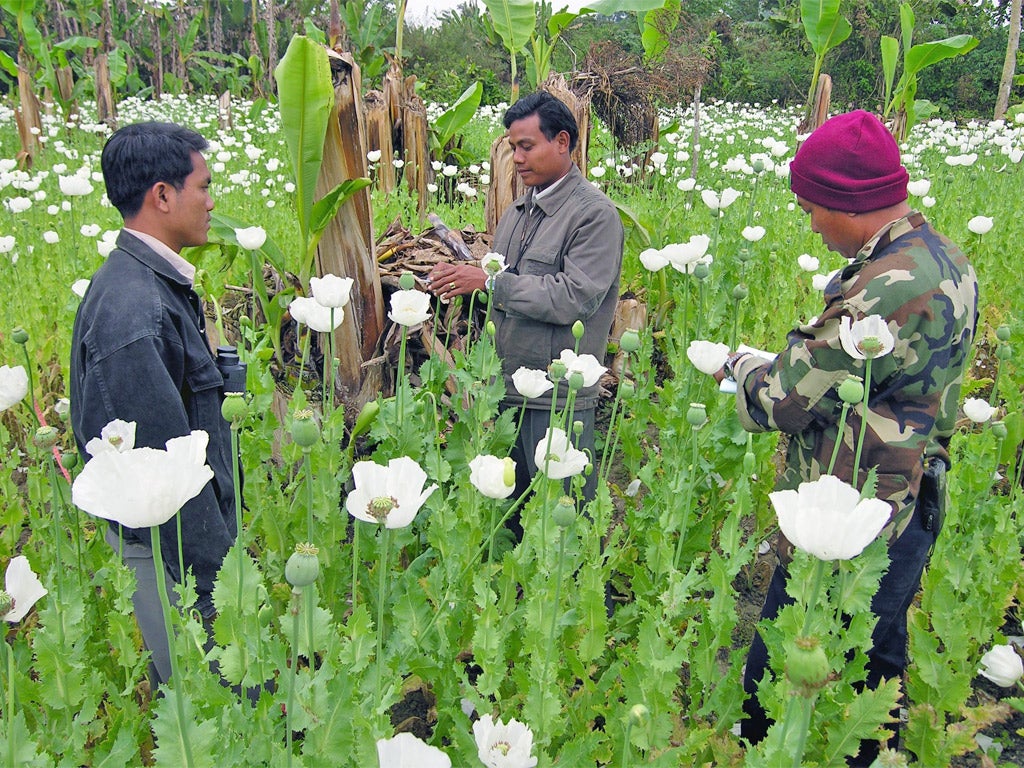The poppy harvest: Burma's boom industry
Efforts to curb the rise in opium production are being undermined by ethnic conflicts

Ongoing ethnic conflicts in Burma are undermining efforts to tackle opium poppy production in the country, which has recorded its sixth consecutive increase in cultivation. The latest finding from the UN suggests claims by the Burmese authorities that cultivation will be eradicated within two years will prove false.
Although unprecedented efforts to destroy poppy fields resulted in almost 60,000 acres being ripped up last year, the amount of land under cultivation still increased by around 17 per cent. Burma is the world's second-largest producer of opium, after Afghanistan.
Officials from the UN Office on Drugs and Crime (UNODC) said cultivation had increased most sharply in Kachin and Shan states, where government troops are involved in ongoing and bloody clashes with ethnic fighters. Many of the farmers producing opium poppies have inadequate access to the land and are often short of food. They can earn almost 20 times as much growing poppies as they can producing rice.
Jason Eligh, the Burma country manager for UNODC, said in a statement: "Eradication alone is not an effective response to reduce opium poppy cultivation. We must remember why farmers grow poppies. In most cases it is because they need cash to buy food to feed their families."
The UN body said that a full 90 per cent of Burmese opium poppy cultivation took place in Shan state, with most of the remaining 10 per cent being grown in Kachin.
"In areas of instability like Shan and Kachin states with poor access to markets, there are few employment alternatives to poppy," added Mr Eligh. "A sustainable long-term solution can only come through significant investment in stability, the rule of law and alternative development."
The issue of opium production is a challenge for the nominally civilian government of President Thein Sein. He has been able to reach ceasefire agreements with some, but not all, of the ethnic groups that have been fighting for autonomy from the government for many years. Reuters reported that, in February this year, Thein Sein's legal adviser, Sit Aye, said they wanted to eradicate poppy production by 2014.
At the launch of the UNODC report in Naypyidaw, Burma's deputy minister of home affairs, Maj Gen Kyaw Kyaw Tun, also said that eradication programmes could only be part of the solution.
"Burma did a lot of poppy eradication last year. This shows that law enforcement can have a significant impact on opium cultivation," he said. "However, effectively to reduce opium cultivation we need to do a lot more alternative development, including strengthening the livelihoods of opium farmers."
The minister, who is also the country's police chief, added: "We invite donors and the international community to help us reduce opium cultivation and production – which is not only a Burmese problem, but a global concern."
The UN body estimates that Burma will produce around 690 tonnes of opium this year, up from 610 tonnes. This represents about 10 per cent of all the opium produced in the world. Afghanistan produces around 90 per cent. Burma's opium production is largely driven by demand from China, which accounts for around 70 per cent of the heroin consumption in East Asia and the Pacific.
Join our commenting forum
Join thought-provoking conversations, follow other Independent readers and see their replies
Comments